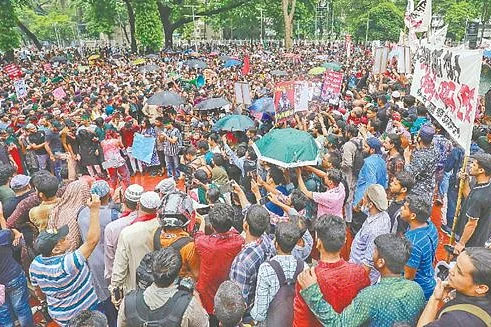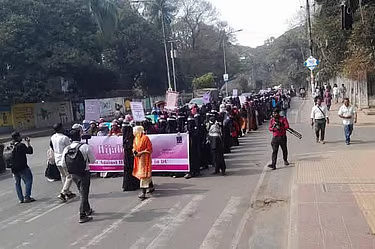A non-violent student movement against the quota system for government jobs in Bangladesh has rapidly evolved into a significant government-opposing “Gen-Z” revolution. This youth-driven uprising emerged in a society already discontented with escalating living costs, corruption, and harsh repression of dissent. M. Niaz Asadullah explores this transformative movement, drawing parallels with the Arab Spring.
On August 5, Sheikh Hasina, the country’s autocratic leader, was unexpectedly ousted. This development has prompted Nobel Peace Prize laureate Muhammad Yunus to call for a “Second Independence Day” in Bangladesh.
Initially centered on opposition to the quota system, the student movement swiftly expanded into broader government dissent. The catalyst for this shift was the killing of student leader Abu Saeed on July 16, which intensified protests. In response, the Hasina administration attempted to suppress the unrest through violence, deploying police, border guards, and military forces, which only escalated public outrage.
Despite the government’s efforts to quell the protests through internet restrictions and curfews, clashes continued, resulting in substantial casualties. The violence on August 4 marked one of the most bloodied days in the country’s history, eventually leading the military to intervene and prompting Hasina’s resignation to prevent further bloodshed.
The quota system had become a symbol of Hasina’s broken promises and corruption. With a burgeoning number of university graduates and insufficient job creation, many young people faced unemployment. The frustration was exacerbated by uneven economic growth, corruption, and the preferential treatment of party loyalists.
The government’s focus on controversial large-scale infrastructure projects and an expanding bureaucracy, rather than addressing private sector job creation or improving educational outcomes, deepened the crisis.
Following Hasina’s departure, the establishment of an interim government led by Yunus presents a pivotal opportunity to address these systemic issues. However, restoring democracy in Bangladesh will involve overcoming significant challenges, including stabilizing the economy, rebuilding trust in the business sector, securing international development support, and reestablishing civil order.
Yunus, with his extensive experience in grassroots development and social entrepreneurship, is well-positioned to address these challenges. Nonetheless, the future of democratic renewal in Bangladesh remains uncertain. The dismantling of essential democratic institutions and the recent chaos suggest a precarious situation. Political parties are advocating for early elections, and signs of instability persist.
In contrast to the Arab Spring, which faltered due to limited youth engagement in politics, the Bangladeshi Gen-Z movement has not only led to the downfall of an autocrat but also actively participated in governance. Student volunteers have engaged in community services and safeguarded minority communities, underscoring the movement’s commitment to reform and good governance.
If the elite class adapts to this new reality and the youth maintain their commitment to democratic ideals, the “Bangla Spring” could continue to drive positive change, fostering a more inclusive and accountable leadership.
M. Niaz Asadullah is a Visiting Professor of Economics at the University of Reading, Malaysia, and the Head of the Southeast Asia Cluster at Global Labor Organization.









